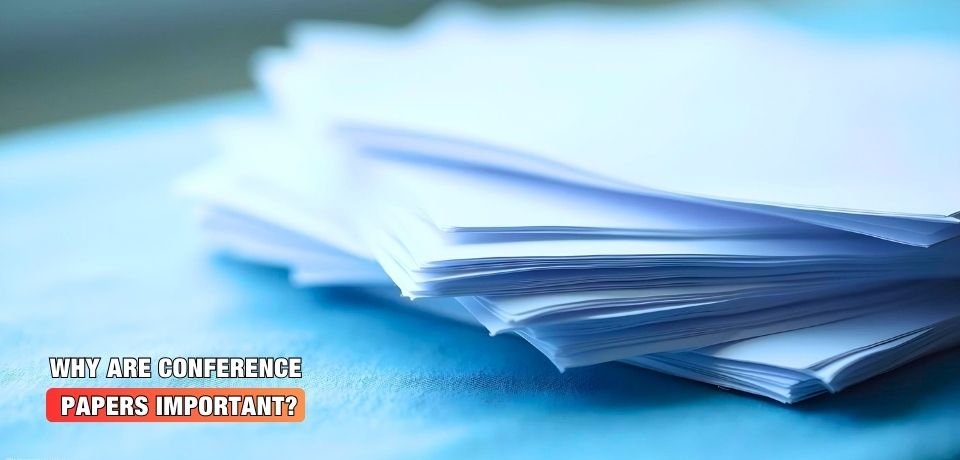Imagine yourself as a researcher with an innovative idea who wants to share it with the public at large. You’ve spent countless hours developing your concept, but how do you get it in front of those who can truly appreciate and critique it? This is where conference papers come into play. But why are conference papers important?
Conference papers are important as they allow researchers to explore innovative ideas, receive insightful feedback, build professional credibility, and encourage a vital exchange of knowledge within the academic community.
Additionally, submitting these papers is frequently required to participate in many academic conferences, offering a platform to highlight one’s research. Stay tuned as we explore the countless benefits and essential roles of conference papers.
Is a Conference Paper a Good Source of Information?
Yes, a conference paper is a reliable source of information. These documents are often the first place researchers share their newest findings. Peers review this work, ensuring the information is credible and valuable. It’s a great way to learn about recent developments and innovative ideas.
In academic circles, these papers represent the latest research. They’re presented at conferences where feedback from experts refines the ideas further. This collaborative environment helps polish the research, making the findings valid and dependable. Researchers value these interactions as they increase the quality of their work.
When looking for fresh and specialized knowledge, conference papers are a go-to. They cover niche topics not yet found in textbooks or journals. This makes them particularly useful for those needing the latest research. They are a cornerstone of academic communication, connecting ideas and people.
Why are Conference Papers Important?
In academia, industry, and professional fields, conference papers provide an opportunity to share research and advance the field. They are essential to innovation, collaboration, and growth across diverse fields.

These documents not only present fresh ideas but also invite criticism that can refine and sharpen research. The following are a few reasons why conference papers are important:
Introducing New Ideas
Conference papers are a primary opportunity for academics and professionals to present new research and innovative concepts. This initial exposure to a knowledgeable audience helps validate and refine ideas, making them more robust and applicable. Researchers benefit from this direct feedback, which often leads to significant revisions and improvements.
The opportunity to explore these ideas in a supportive yet relevant environment is invaluable. It encourages researchers to think creatively and challenge existing paradigms, contributing to the dynamic evolution of their fields.
Encouraging Constructive Feedback
The interactive nature of conferences allows for immediate and constructive feedback from peers. This significant review is vital for improving the quality of the research presented, addressing potential weaknesses, and strengthening the findings. Feedback at this stage is crucial for academic and professional development.
Presenters can engage in discussion, answer questions, and defend their methodologies, which reinforces the rigor and validity of their work. Such exchanges promote a deeper understanding and refinement of research, benefiting both the presenter and the audience.
Building Professional Networks
Conference papers significantly contribute to a researcher’s professional stature. Presenting at well-regarded conferences can elevate an individual’s profile in their field, leading to opportunities for collaboration and further research. It’s an effective way to connect with other experts and expand one’s professional network.
These conferences provide a platform for meeting new collaborators and discussing potential partnerships. Networking at conferences can lead to joint research projects and new avenues of inquiry, enhancing one’s career and the scope of their work.
Inspiring Further Research
Often, conference papers lead to new research avenues and inspire other academics to explore related topics. They introduce new theories and methods that may lead to substantial shifts in how research is conducted in certain areas. This stimulation of additional research is essential for the progression of any field.
Such presentations can highlight gaps in the current knowledge base, proposing new directions for future work. They serve as a call to action for other researchers to engage with and build upon the presented ideas.
Promoting Knowledge Exchange
Conferences bring together diverse groups of people from various backgrounds, enhancing the exchange of knowledge. This interaction enriches the research landscape, as different perspectives and approaches are shared openly. Conference papers act as a medium for this exchange, broadening the impact of the research.
This diversity of input and critique helps refine the quality of the research, ensuring that it withstands the scrutiny of a global community. The collaboration and cross-pollination of ideas contribute to a richer academic discourse.
Securing Conference Participation
For many researchers, presenting a paper is a prerequisite for attending significant conferences. This requirement ensures that only those actively contributing to their fields are in attendance, maintaining a high standard of discourse and engagement at the event.
Having a paper accepted at a conference is a mark of honor and recognition, affirming the relevance and quality of one’s research. It opens the door to further opportunities for presenting, networking, and publishing.
Steps You Can Take to Write a Conference Paper for a Business Conference
The process of writing a successful conference paper involves a series of strategic steps. All of the steps to write a business conference paper are crucial for preparing a compelling and professional document. Follow these steps to create a paper that stands out and effectively communicates your ideas.

Step 1: Be Familiar With the Conference Theme
Begin by thoroughly exploring the theme of the conference. Align your topic with the theme to ensure relevance and appeal. This will help your paper resonate with the audience and meet the expectations of the organizers. A clear focus on the theme strengthens your overall argument.
Step 2: Do a Detailed Research on the Topic
Gather all the data and insights on your chosen topic. Use credible sources to support your arguments and provide a solid foundation for your paper. This step ensures that your content is both accurate and informative, adding value to the discussion. Strong research forms the backbone of a successful conference paper.
Step 3: Develop a Clear Structure
Organize your paper into a logical structure, typically including an introduction, body, and conclusion. Ensure that each section flows seamlessly into the next, maintaining clarity throughout. A well-structured paper makes it easier for readers to follow your arguments and grasp your key points. This structure is crucial in delivering a coherent message.
Step 4: Write with Clarity and Precision
Focus on clear and concise writing to communicate your ideas effectively. Avoid jargon or overly complex language that may confuse readers. Precision in your writing will ensure that your arguments are understood and appreciated by the audience. Clear communication is key to making a strong impact.
Step 5: Incorporate Visuals and Data
Improve your paper by including relevant visuals and data to support your arguments. Charts, graphs, and tables can illustrate points more vividly than text alone. These elements can make your paper more engaging and easier to digest for the audience. Visual aids are powerful tools for conveying complex information.
Step 6: Revise and Edit Thoroughly
Carefully review your paper for any errors or inconsistencies. Make sure your arguments are logical, and your writing is free of grammatical mistakes. Editing is a crucial step in polishing your paper and ensuring it meets high standards. A well-edited paper is more likely to be well-received at the conference.
By following these steps, you’ll be well-prepared to present your ideas effectively and make a significant contribution to the conference.
Writing an Engaging Conference Paper – How Does It Benefit You?
There are many advantages to writing a conference paper, both in academia and in your professional career. It allows you to share your ideas, gain recognition, and connect with your peers. Here, we explore how preparing an engaging conference paper can benefit you:

Showcasing Your Analytical Skills
Writing a conference paper allows you to demonstrate your ability to analyze complex topics. It requires you to break down intricate ideas into digestible parts. This skill is valuable in both academic and professional settings. Highlighting your analytical prowess can set you apart in your field.
Refining Your Writing Skills
Your ability to communicate complex ideas clearly and concisely improves when you write a conference paper. In the process of writing a conference paper, you are required to express your thoughts in a structured and coherent manner. Improving your writing skills will benefit you in all areas of your career, as clear communication is key to effective professional interactions.
Boosting Your Confidence
Presenting your work at a conference builds your confidence in public speaking. Successfully delivering your paper validates your research and your ability to convey it. The confidence gained through this experience extends to other professional situations. It empowers you to take on more challenging roles.
Influencing Industry Trends
Your conference paper can have a real impact on shaping industry trends. Innovative ideas presented at conferences often lead to new approaches and solutions. This influence is significant for driving progress within your field. Your contributions can lead to industry-wide changes and advancements.
Gaining Practical Experience
Writing and presenting a conference paper provides hands-on experience in academic and professional settings. It teaches you how to manage deadlines, structure arguments, and engage with an audience. These practical skills are transferable to many areas of your career. Gaining this experience prepares you for future challenges.
Tips to Maximize the Impact of Your Conference Paper
Maximizing the impact of your conference paper is crucial for effectively communicating your research. With careful preparation and attention to detail, you can ensure your work stands out. Here are some tips to help you achieve that.
- Choose a Compelling Topic: Selecting a topic with broad appeal will capture the audience’s interest. Ensure your topic is relevant and timely for maximum engagement.
- Craft a Clear Structure: Organize your paper logically to guide the reader through your arguments. A clear structure makes your research easier to follow.
- Use Visual Aids Wisely: Incorporate charts and graphs to support your data and increase retention of information. Visual aids help convey complex ideas succinctly.
- Focus on Key Takeaways: Highlight the main points you want your audience to remember. Summarize these takeaways clearly in your conclusion.
- Engage with the Audience: Anticipate potential questions and address them in your paper. This engagement shows a deep knowledge of the subject.
- Practice Your Presentation: Rehearse delivering your paper to ensure a smooth and confident presentation. Familiarity with your material reduces the risk of errors.
- Solicit Feedback Before Submission: Seek input from colleagues to refine your paper. Early feedback can identify areas for improvement and increase its effectiveness.
- Follow Submission Guidelines Carefully: Adhere strictly to the conference’s formatting and submission rules. Compliance with guidelines reflects professionalism and attention to detail.
FAQs About Why are Conference Papers Important?
Conference papers play a crucial role in the academic and professional world. They provide a platform for researchers to present their work, receive feedback, and engage with the academic community. Here are some frequently asked questions about their importance.
What Makes Conference Papers Different from Journal Articles?
Conference papers are typically presented earlier in the research process compared to journal articles. They offer a preliminary look at new findings, allowing researchers to gather feedback before formal publication. This makes conference papers a unique and dynamic component of academic communication.
How Do Conference Papers Aid in Knowledge Sharing?
Conference papers facilitate the exchange of knowledge by bringing together diverse perspectives. They provide a platform for researchers to share findings, methodologies, and insights, contributing to the collective knowledge of a field. This sharing process enhances the overall quality of research.
Why Are Conference Papers Valuable for Early-stage Research?
For early-stage research, conference papers are valuable because they allow researchers to share and test their initial findings with a wider audience. This early feedback is crucial for refining hypotheses and methodologies before formal publication in journals.
How Do Conference Papers Facilitate International Collaboration?
Conference papers facilitate international collaboration by bringing together researchers from different countries to share their work. These interactions promote cross-border partnerships and collaborative projects, broadening the scope and impact of research.
What Is the Significance of Peer Feedback on Conference Papers?
Peer feedback on conference papers is significant as it provides researchers with diverse perspectives and critiques that can improve their work. This feedback helps identify strengths and weaknesses, leading to revisions that improve the quality and impact of the research.
Conclusion
The role of conference papers in academia and professional fields is crucial for the exchange of innovative ideas between researchers. They allow the exchange of knowledge, enabling constructive feedback that refines research and promotes collaboration.
So, knowing why are conference papers important reveals their value in building professional credibility and networking opportunities. These papers also inspire further research, encouraging scholars to explore new avenues and address knowledge gaps.
Additionally, presenting at conferences can significantly boost an individual’s reputation within their field. In the end, conference papers are essential resources for advancing research, encouraging innovation, and contributing to the continuous development of different fields.